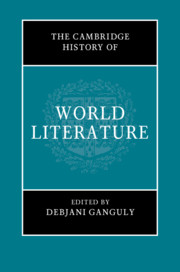Book contents
- The Cambridge History of World Literature
- The Cambridge History of World Literature
- Copyright page
- Contents
- Figures
- Contributors
- Acknowledgements
- Introduction
- Part I Genealogies
- Part II Thinking the World
- Part III Transregional Worlding
- Part IV Cartographic Shifts
- Part V World Literature and Translation
- Part VI Poetics, Genre, Intermediality
- Part VII Scales, Polysystems, Canons
- Part VIII Modes of Reading and Circulation
- Part IX The Worldly and the Planetary
- Index
- References
Introduction
Published online by Cambridge University Press: 17 August 2021
- The Cambridge History of World Literature
- The Cambridge History of World Literature
- Copyright page
- Contents
- Figures
- Contributors
- Acknowledgements
- Introduction
- Part I Genealogies
- Part II Thinking the World
- Part III Transregional Worlding
- Part IV Cartographic Shifts
- Part V World Literature and Translation
- Part VI Poetics, Genre, Intermediality
- Part VII Scales, Polysystems, Canons
- Part VIII Modes of Reading and Circulation
- Part IX The Worldly and the Planetary
- Index
- References
Summary
World literature dwells in our time and in times past. As a treasured heritage of artistic expression in oral, visual, and written forms, it is an indelible part of the story of evolution of human civilization. As a scholarly field, however, world literature has had a rather sporadic presence in the disciplinary landscape of modern universities, surging and receding in accordance with political and sociocultural transformations. The contemporary era is witnessing one such resurgence. The term world appears to have made a spectacular reentry as a literary critical rubric in the twenty-first century. One hears of the “world” all too frequently in academic circles, and in ways that mark our current global conjuncture as, perhaps, the most apposite moment for its articulation. One is reminded of Walter Benjamin’s phrase “the now of knowability” when certain historical periods offer just the right temporal traction for an idea to gain rhetorical currency.
- Type
- Chapter
- Information
- The Cambridge History of World Literature , pp. 1 - 46Publisher: Cambridge University PressPrint publication year: 2021
References
- 2
- Cited by



